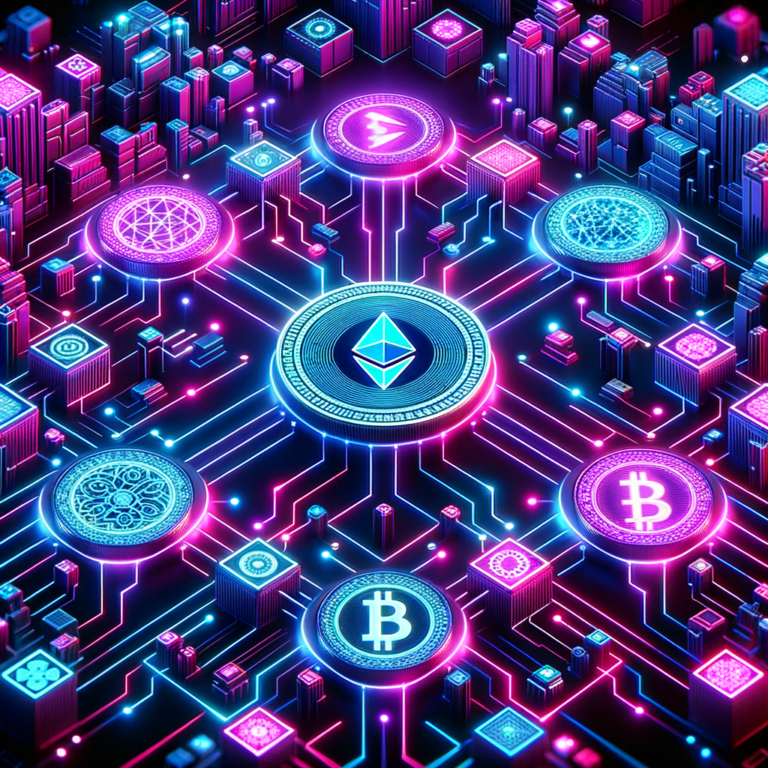Exploring the Dynamic Crypto Gaming Ecosystem
The rise of blockchain technology has paved the way for innovative sectors within the digital economy, one of which is the burgeoning field of crypto gaming. This dynamic ecosystem blends traditional gaming elements with cutting-edge cryptographic and financial technologies, offering a new paradigm of interactive entertainment. In this article, we’ll explore the various facets of the crypto gaming ecosystem, from its technological underpinnings to its economic models, leading games, regulatory issues, and future trends.
Introduction to Crypto Gaming Ecosystem
Crypto gaming, a subset of the broader video game industry, leverages blockchain technology to provide decentralized and often token-based gaming experiences. These games differ from traditional video games primarily through the use of cryptocurrencies and non-fungible tokens (NFTs), allowing for unique in-game assets ownership and trade. As blockchain technology matures, the ecosystem surrounding crypto gaming expands, encompassing developers, players, investors, and regulators. This integration of finance and gaming has not only attracted a new demographic of gamers but also investors looking for novel opportunities in the gaming sector.
Key Components of Crypto Gaming
The crypto gaming sector is built on several key components that distinguish it from traditional gaming. First, digital asset ownership is facilitated by blockchain technology, where items and characters are often represented as NFTs, providing verifiable ownership and scarcity. Second, play-to-earn models enable players to earn crypto rewards through gameplay, creating economic incentive to play and contribute to the game ecosystem. Third, decentralized gaming platforms allow for the creation and operation of games on blockchain networks, reducing the need for centralized control. Lastly, community governance models empower players to participate in decision-making processes regarding game development and updates.
Technological Foundations of Blockchain Games
Blockchain games are underpinned by several core technologies. Smart contracts automate game operations and ensure that transactions like trading in-game items are secure and transparent. Distributed ledger technology provides a decentralized framework, ensuring that game data is immutable and resistant to fraud. Interoperability protocols enable assets to be used across different gaming platforms, enhancing their utility and value. Furthermore, scalability solutions such as layer-2 networks or sidechains are critical in supporting large numbers of transactions, vital for mass adoption.
Economic Models in Crypto Gaming
The economic models in crypto gaming typically revolve around the tokenization of in-game assets and currencies. Players can earn tokens through gameplay, which might have value both inside and outside the game universe. Some games incorporate elements of DeFi (decentralized finance) to create complex economies where players can lend, borrow, or stake their assets. Moreover, initial game offerings (IGOs) are becoming a popular method for developers to raise funds by selling tokens or assets before a game’s full release.
Leading Crypto Games and Their Impact
Prominent crypto games like Axie Infinity, Decentraland, and The Sandbox have significantly impacted the digital gaming landscape. For instance, Axie Infinity has popularized the play-to-earn model, creating substantial real-world income for players, particularly in developing countries. Decentraland and The Sandbox have developed vast virtual worlds owned by the players themselves, contributing to the real estate concept in virtual environments. These games not only revolutionize how value is perceived and generated in gaming but also expand the market by integrating gamers into crypto economies.
Regulatory Landscape for Crypto Gaming
The regulatory framework for crypto gaming is still evolving, with jurisdictions worldwide grappling with how best to govern these new types of digital assets. Issues such as consumer protection, anti-money laundering (AML), and the classification of tokens (whether as securities, commodities, or otherwise) are at the forefront of regulatory concerns. Some countries have started creating specific guidelines for cryptocurrencies and NFTs, which directly impact crypto gaming platforms and transactions.
Challenges Facing the Crypto Gaming Sector
Despite its rapid growth, the crypto gaming sector faces several challenges. Scalability issues continue to hinder game performance and player experience, particularly on networks like Ethereum, which struggle with high transaction costs and slow speeds during peak times. Additionally, the integration of blockchain technology can complicate game design, potentially impacting the user experience negatively. There’s also a significant barrier to entry for non-crypto-savvy players, and the volatile nature of crypto markets can affect the perceived value of in-game assets.
Future Trends in Crypto Gaming Technology
Looking ahead, several trends are set to shape the future of crypto gaming. AI integration could enhance automated game operations and create more dynamic gaming environments. The growth of metaverse ecosystems, where crypto gaming likely plays a significant role, hints at more immersive and interconnected virtual experiences. Additionally, advancements in blockchain interoperability and scalability are expected to allow more complex and user-friendly games to emerge. Moreover, as the technology and frameworks around NFTs evolve, new types of in-game economic systems and asset classes are likely to develop.
In conclusion, the crypto gaming ecosystem is a rapidly evolving landscape that offers a unique blend of technology, economy, and entertainment. As it continues to mature, the integration of advanced blockchain capabilities, evolving economic models, and a diverse regulatory landscape will play pivotal roles in shaping its future. For enthusiasts, developers, and investors alike, staying informed and adaptable will be key to navigating this exciting sector. The evolution of crypto gaming not only promises to revolutionize the gaming industry but also potentially redefine digital ownership and value creation in the digital age.

